Prostatitis is a process of inflammation of the prostate gland, accompanied by pain when urinating and deterioration in urinary function. Hyperplasia is characteristic of an adenoma or benign tumor. In some cases, the pathology becomes malignant and cancer develops. The disease is more common in patients over 40 years old. But it can develop at a younger age if a person does not adhere to a healthy lifestyle, moves little or eats poorly. Therefore, treatment requires not only the use of medications, but also gentle diet and proper nutrition.
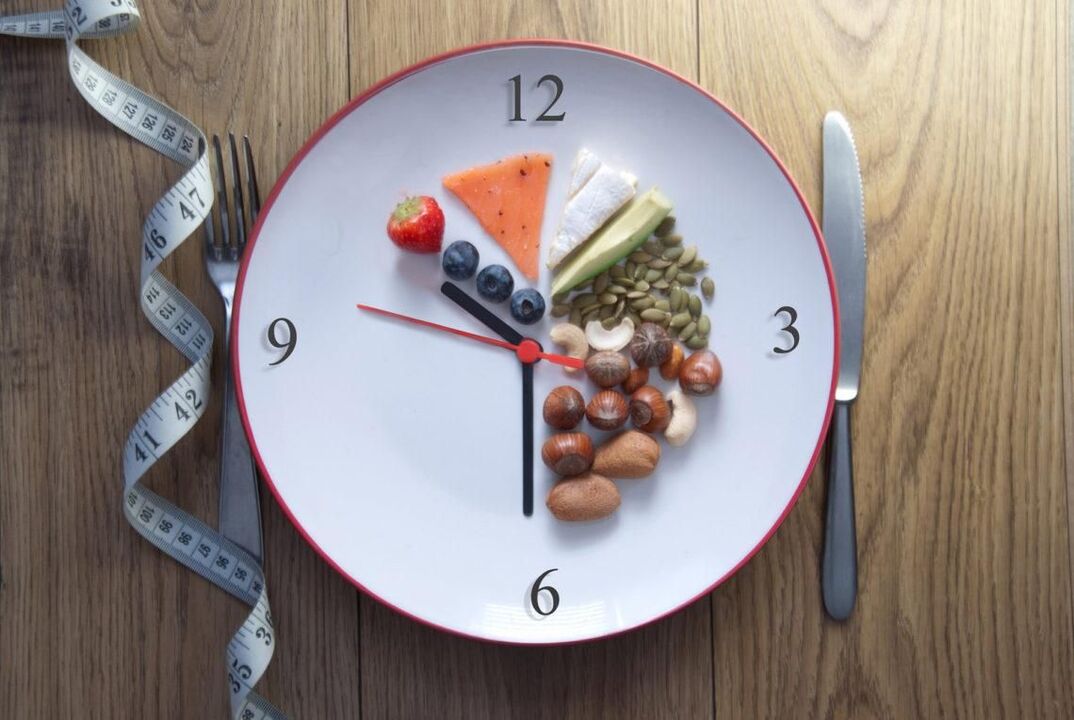
Dietary requirements
In case of inflammation of the prostate, also follow the appropriate diet.It is necessary for the following purposes:
- eliminate constipation, which causes increased pain and impedes blood circulation in the pelvic organs;
- eliminate intoxication in the body, which is observed when feces are stored for a long time in the intestines, where bacteria responsible for rot develop;
- improvement of intestinal motility and the entire digestive process.
To improve all functions of the gastrointestinal tract, it is recommended to include the following types of foods rich in plant fiber in your diet:
- berries, fruits, vegetables, herbs;
- cereals, bran, freshly squeezed fruit juices.
If prostatitis develops, the blood vessels are also affected. They are in a state of spasm and therefore hinder local blood circulation. Cellular hypoxia develops, so they begin to inflame and die. Blood circulation is disturbed not only in the prostate, but also in other pelvic organs. This triggers the development of edema and ascites may form.
To restore blood circulation in the pelvic organs, complex treatment is required. They use medications, physiotherapy, physical activity and diet. The diet includes fatty acids that improve blood circulation, reproductive system activity and testosterone production.

If a man develops prostatitis, additional pathology may develop:
- diabetes;
- atherosclerosis.
Therefore, when the primary disease develops, it is recommended to review your diet and limit foods high in glucose and cholesterol.
Diet Features
To improve men's health, the body must receive a sufficient amount of vitamins, trace elements and minerals that improve the functioning of the urinary and reproductive systems.It must necessarily contain the following elements, the norms of which are assigned to men aged 18 to 50:
- zinc - 30mg;
- selenium - 7 mcg.
To replenish the correct ratio of microelements in the body, consume the following foods:
- seafood - shrimp, mussels, oysters;
- algae, algae, sea fish;
- quail, chicken eggs.
Many urologists advise replacing chicken eggs with quail eggs. They contain a minimum of cholesterol, but a maximum of vitamins and microelements.
Table of foods containing high amounts of selenium.
| Product group | Types of food |
| Eggs | Quail |
| Meat products | Beef liver, rabbit, pork |
| Seafood | Oysters, squid, scallops, octopus |
| Legumes | Beans, peas, lentils |
| Cereals | Oat, buckwheat, corn or barley groats |
| Oil | Olive, flax seeds |
| Nuts | Cedar, walnut |
Table of foods containing zinc.
| Product group | Types of food |
| Seafood | All types |
| Nut seeds | Watermelon, pumpkin, sesame, all types of nuts |
| Meat products | Beef, lamb, liver |
| Fish | All types |
| Eggs | Egg yolk |
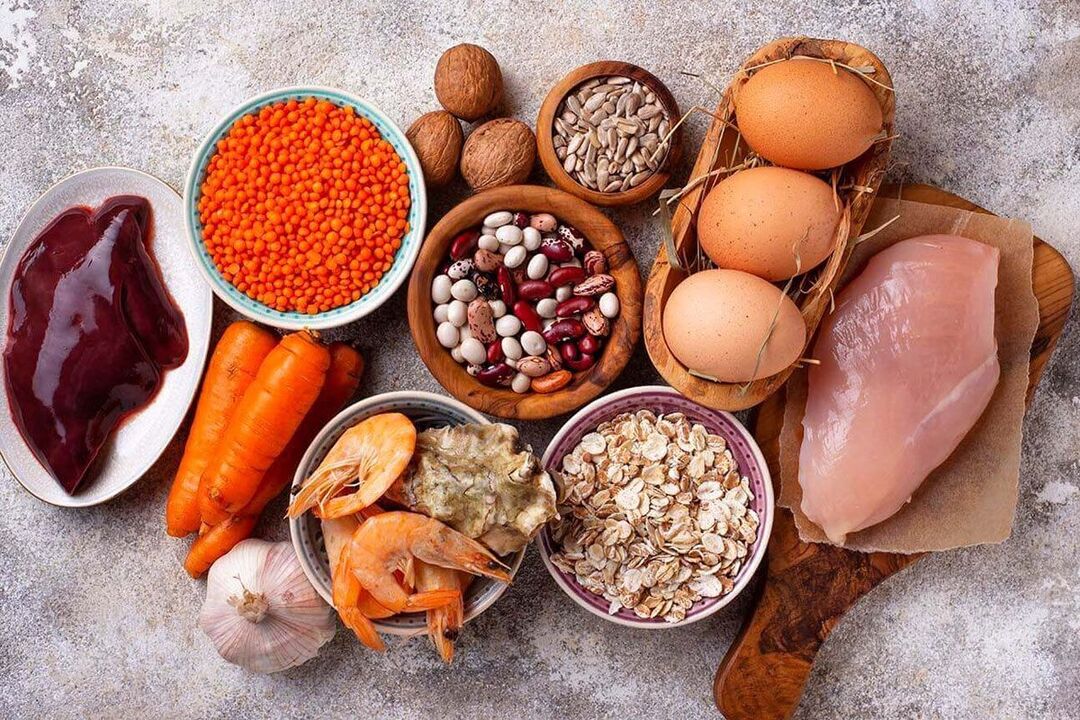
Even if you eat plenty of foods containing selenium and zinc, you may not reach the required levels. This is due to impaired bowel function. It is then recommended to purchase multivitamin preparations containing these substances. Doctors advise using drugs that concentrate not only vitamins, but also antioxidants. They remove free radicals and poisoning products from the body and stimulate the renewal of cellular composition.
To improve testosterone production and regulate estradiol levels, use foods rich in vitamin E.It has the following characteristics:
- remove free radicals, toxins and waste from the body;
- improve the absorption of vitamins and microelements;
- restoration of damaged tissues after a severe inflammatory process.
To avoid relapses of the disease, follow a constant diet.
Nutritional principle
To help the body cope with the disease faster, adhere to the following principles during the diet:
- count the total amount of food for 1 day, which is divided into 5-6 meals, so that a person consumes no more than 300 g of food at a time;
- develop a meal schedule to improve the production of digestive enzymes, absorption of nutrients and prevent the development of constipation;
- It is prohibited to consume any type of liquid several hours before bedtime and throughout the night to avoid swelling and increased activity of the urinary system;
- the diet is based on protein foods, fruits, vegetables, cereals, high-quality oil;
- reduce carbohydrate levels to a minimum.
Many men with chronic prostatitis are overweight or obese. They then consult a gastroenterologist or nutritionist who selects optimal nutrition and a strict diet. This applies to men whose weight exceeds 100 kg. Obesity places additional stress on the prostate, so the organ's function declines even further. This makes it difficult or completely eliminates the effect of the treatment.
Product exclusion
If a man has developed prostatitis, it is recommended to exclude the following types of foods and spices used in the daily diet:
- a large amount of salt, which causes water retention in the body, which leads to swelling, especially of the prostate;
- seasonings, spices, marinades, pickles, homemade preparations - increase tissue swelling and lead to the accumulation of subcutaneous fat;
- fish eggs, preserves, sausages, salted cheese;
- chocolate, confectionery, other cocoa products;
- lemonade, soda;
- bread, baked goods, sauces;
- products containing a large number of chemicals, emulsifiers, dyes, stabilizers, carcinogens, preservatives;
- dairy products with a long shelf life, greater than 7 days.
If you do not reduce the amount of these products, fluid will continue to accumulate, increasing compression of the inflamed tissues. The inflammatory process will intensify even more, local blood circulation will become difficult, and the condition will begin to worsen and become more complicated.
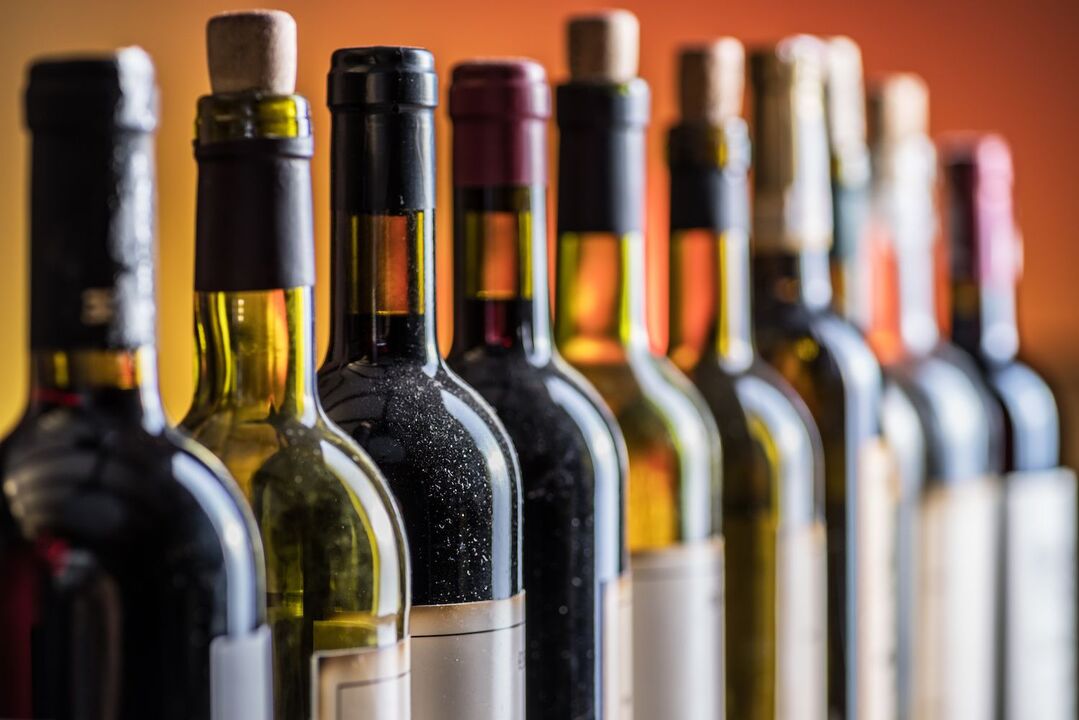
Attention! Any type of alcoholic beverages is prohibited. Especially if it concerns the period of exacerbation, then you should not use them in any doses. Ethyl alcohol negatively affects the entire circulatory system and hinders blood circulation. This worsens the condition of the prostate during the inflammatory process. Acute hypoxia develops and nutrient intake decreases. Gradually, the man develops infertility, impotence, and the adenoma transforms into a malignant form.
As soon as the period of exacerbation ends, the condition becomes chronic or in remission, it is allowed to add a small amount of products:
- dark chocolate, cocoa;
- vegetables with a high concentration of purines, peas, beans;
- ventricles, beef liver.
Some patients in remission or chronic inflammation of the prostate drink alcohol.Then they must follow the rules:
- use only high-quality alcohol;
- ban on drinking ethyl alcohol on an empty stomach;
- using high-protein snacks;
- Observe your own sensations, if pain or dizziness appears, stop drinking alcoholic beverages;
- use a minimum dose so as not to cause intoxication of the body.
To prevent intoxication and exacerbation of prostatitis, it is recommended to adhere to the minimum dosage rules for different types of alcoholic products:
- vodka - up to 150 ml;
- beer - no more than 0. 5 l;
- wine - no more than 200 ml.
Alcoholic beverages can be consumed no more than 1-2 times a month. Strictly follow the indicated dosage.
Products consumed
When you get sick, your body needs foods that contain the maximum amount of microelements and vitamins. They consume foods containing a large amount of protein, a minimum level of carbohydrates and fats.Eat the following foods that contain small amounts of healthy fats:
- olive, flax, pumpkin oil;
- low-fat sour cream;
- a small piece of lard, which is eaten once a month.
Animal fats are not recommended, they concentrate large amounts of cholesterol. This can hamper blood circulation due to the buildup of cholesterol plaques that block the vessels. Therefore, before cooking the meat, remove the skin and the fat layer.
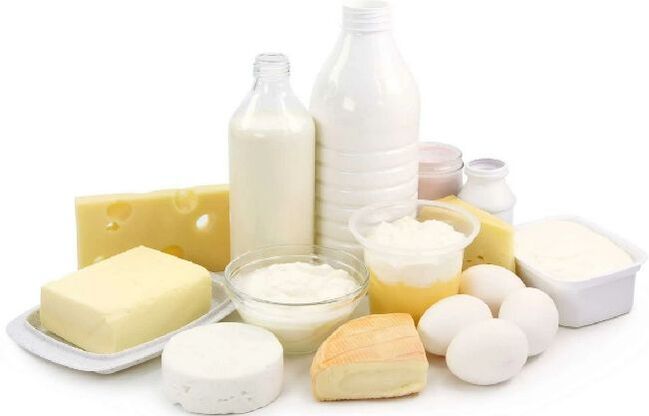
Recommendations for protein consumption:
- eat a small amount of chicken meat, it contains purines that are quickly deposited in the body;
- Basically, the diet should contain rabbit, beef, lamb;
- add a small amount of egg white and natural dairy products;
- fish of any variety, which is recommended to be consumed at least 2-3 times a week.
To increase the proportion of protein in the diet, eat nuts and seeds. But they are used only at the end of the acute period of the inflammatory process. Dairy products are used daily to replenish calcium and other nutrients.
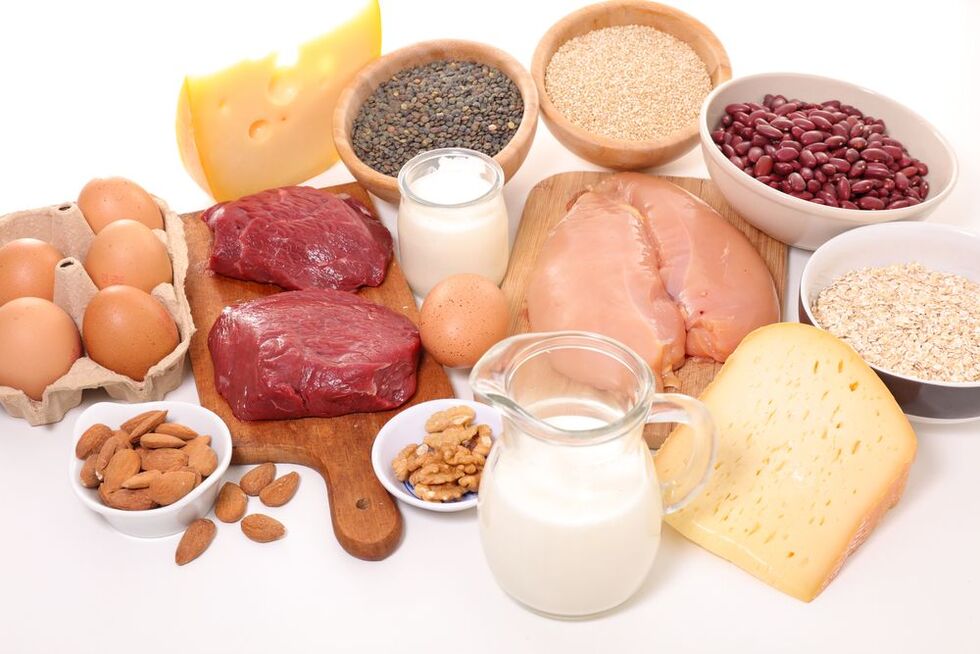
Among all foods rich in carbohydrates, only the following foods are allowed:
- dried fruits, berries, fruits;
- cereals, cereals, starchy vegetables;
- sweets in the form of jelly or marmalade.
Doctors remind that it is better to limit the content of foods rich in starchy foods. This leads to constipation and increased inflammation of the prostate. Therefore, among all starch products, it is allowed to use cucumbers, eggplants, garlic and tomatoes. They are quickly absorbed, saturate the body with vitamins and microelements and prevent stress on the digestive tract and the development of constipation. Little by little, the blood vessels are cleansed and toxins are eliminated.
It is prohibited to fry, cook, smoke food. It must be boiled, steamed, stewed. Add a minimal amount of salt and exclude spices.
Nutritional menu for prostatitis
The table shows an approximate diet for a week.
| Day | Breakfast | Lunch | Dinner | Afternoon snack | Dinner | Late dinner |
| First of all | Oatmeal with milk 150 g, carrot juice 100 ml, vegetable salad 100 g | Vegetable puree 150 g | Tomato and cucumber salad with olive oil 100g, boiled fish in tomato sauce 200g, rosehip decoction 150g | Kefir 150 ml, crackers 3 pieces | Steamed beef cutlets, two pieces, durum wheat pasta 100 g, mineral water 150 ml | Kefir 150 ml |
| Second | Barley porridge 200g, 1 banana, orange juice 100 ml | 2 hard boiled eggs | Borscht with vegetable broth 200 ml, grilled chicken breast with vegetables 200 g, dried fruit compote 150 ml | A small amount of dark, milk chocolate 150 ml | Seafood salad with vegetables 200 g, rosehip decoction 150 ml | Low fat yogurt 200 ml |
| Third | Rice porridge 150 g, weak tea 200 ml, biscuits 2 pieces | Fruit slices | Fish soup 200 g, chopped vegetables with boiled chicken 200 g, fruit compote 150 ml | Fruit jelly 150 g, biscuits 3 pieces | Steamed meatballs with sweet peppers and tomatoes 200 g, herbal tea 150 ml | Riajenka 150ml |
| Fourth | Buckwheat porridge with milk 200 g, dried fruits, green tea 150 ml | Nuts of different varieties | Pumpkin puree soup with rye bread 200 g, apple juice 200 ml | Baked cheesecakes 200 g, berry juice 150 ml | Steamed cod 150 g, vegetables 150 g, berry jelly 100 ml | Kefir 150 ml |
| Fifth | Corn porridge in milk 200 g, unsalted cheese 2 slices, black tea 150 ml | Baked apple | Steamed beef escalopes, durum wheat pasta 250 g, green tea 150 ml | Curd casserole with raisins 150 g | Stewed rabbit meat with low-fat sour cream 200 g, sliced vegetables 100 g, mineral water 150 ml | Riajenka 150ml |
| Sixth | Steamed omelette of 3 eggs, freshly squeezed orange juice 150 ml | Fruit slices 200g | Chicken soup 150 g, lamb compote 150 g, vegetable puree 100 g, fruit compote 150 ml | Pumpkin seeds | Salmon cutlets 2 pieces, boiled buckwheat 150 g, chamomile tea 150 ml | Milk 150 ml |
| Seventh | Oatmeal 150 g, 1 boiled quail egg, apple juice 150 milliliters | Fresh berries 150 g | Lamb pilaf 200 g, dried fruit compote 150 ml | Curd casserole 150 g, black tea 150 ml | Boiled beef 100g, stewed cabbage 100g, green tea 150ml | Freshly squeezed vegetable juice 150 ml |
If you follow the rules of the prescribed diet, you can alleviate the condition of a person with prostatitis. Proper nutrition prevents relapses of the disease, reduces swelling and inflammation of the prostate. Recovery is faster and you can reach the remission phase in a short time. But we must not forget about the drug treatment prescribed by a doctor. The diet is an auxiliary method that must be prescribed by a urologist or nutritionist based on the medical history and characteristics of the patient's body.






























